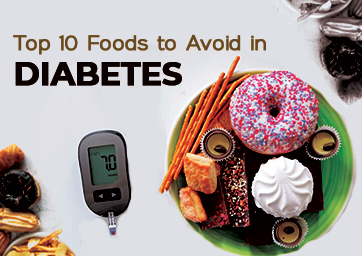Top 7 Foods to Eat for Diabetes
1. Non-starchy Vegetables
Non-starchy vegetables such as babycorns, spinach, beans, kale, and others are loaded with essential nutrients and minerals that regulate your body’s blood sugar levels and help people suffering from type 1 and type 2 diabetes. To get maximum benefits from non-starchy vegetables, choose canned, freshly prepared, or frozen vegetables with no added colors or preservatives. You can get in touch with your healthcare professional before including non-starchy veggies in your diet.
2. Leafy Greens
Another must-have food, if you’re suffering from diabetes, is leafy greens, including spinach and kale. Leafy greens contain large quantities of vitamin C and are highly rich in nutrients, which rightfully manage type 2 diabetes. Moreover, it promotes healthy well-being. Leafy greens are rich in antioxidants that are great for your eyes. The best part is you can prepare mouth-melting recipes using leafy greens, adding taste to your bland diet.
3. Fatty Fish
If you’re suffering from diabetes and eat non-vegetarian food, including fatty fish in your diet is a great decision. Fatty fish contains omega-3 fatty acids that control your insulin levels, improve sensitivity, and reduce diabetic complications. Some significant complications include nephropathy, retinopathy, support cardiovascular health, neuropathy, and cardiomyopathy. Fatty fish also contain other essential nutrients like vitamin E, which manages sugar levels.
4. Eggs and Nuts
Other fatty foods that avoid constant blood sugar level fluctuations and effectively manage diabetes are eggs and nuts. Nuts contain fiber in high amounts and contain carbs in low quantities, ensuring your blood sugar levels will be in control. Eggs are also recommended to diabetic patients as they positively impact blood sugar levels and control spikes. Additionally, many studies prove that eggs decrease inflammation and improve insulin sensitivity. If you’re including eggs in your diet, eat yolk as it contains the most nutrients.
5. Dairy
As per a report by HealthMatch, Dairy products like milk are rich in nutrients, which has proven beneficial for people suffering from diseases. Since milk contains calcium, it strengthens your bones. Above all, dairy foods contain high levels of magnesium and potassium. It is also useful for people suffering from high blood pressure. When you drink dairy items, make sure you avoid artificial sweeteners, as they may increase your blood sugar levels. If you’re consuming dairy products like milk, ensure you get in touch with your health expert before including it in your diet.
6. Spinach
Vegetables like spinach are rich in magnesium, successfully controlling type 2 diabetes. Spinach is also rich in vitamins A, C, and E, along with iron and calcium, strengthening your muscles and bones. Since leafy vegetables contain vitamin K and folate, they control overall blood sugar levels.
Read More: 10 Health Benefits Of Spinach
7. Cinnamon and Turmeric
When it comes to managing diabetes, cinnamon and turmeric, two of the most useful and powerful spices, show wonders when included in your diet. Add cinnamon powder or sticks to curries, vegetables, or drinks that improve your blood sugar levels and reduce insulin sensitivity. Turmeric contains ingredients that successfully tackle inflammation, reduce the chances of heart diseases like stroke, provide kidney benefits, and more. Mix turmeric with black pepper, which gives rise to a useful ingredient called curcumin. Curcumin reduces your blood sugar levels and other related diseases.
Top 10 Foods to Avoid in Diabetes
1. Processed Meats
Processed meats like sausages, bacon, and deli meats are rich in sodium and contain harmful chemicals that are not present in fresh meat, resulting in high blood sugar levels. Many processed meats are rich in unhealthy trans and saturated fats, which contributes to insulin resistance, resulting in type 2 diabetes. Consider replacing processed meats with more natural protein choices like poultry, fish, tofu, legumes, nuts, chicken, turkey, tuna or hard-boiled eggs.
2. Chocolate and Desserts
Chocolates and desserts typically have high sugar content, unhealthy fats and refined carbohydrates, which diabetic patients should avoid. Consuming sugary foods can spike your blood sugar levels very fast. As a result, it becomes challenging to manage diabetes. Desserts generally lack fiber, which slows down the absorption process, promoting diabetes. When it comes to chocolates and desserts, it becomes difficult to control portions, resulting in higher calorie intake. Thus, it is best to limit yourself from deserts and rely on alternative options like dark chocolates, sugar-free desserts and fruit-based desserts.
3. Full-fat Dairy Products
Full-fat dairy products are rich in bad or saturated fat, which enhances the risk of heart disease and obesity. People who have diabetes are often advised to limit the consumption of full-fat dairy products like whole milk, cheese, and regular butter, which increases calorie intake and spikes blood sugar levels. Additionally, patients with diabetes are at a higher risk of developing heart diseases and strokes. Thus, they should replace full-fat dairy products with non-fat dairy products like soy or almond milk.
4. Processed Baked Food
Processed baked food items like cookies, pastries, and muffins have higher levels of sugar percentage, which can be proven dangerous for people suffering from diabetes. Most processed baked food is made using refined carbohydrates, which get digested too quickly, resulting in an instant blood sugar level spike. This food lacks fiber and other nutrients which are necessary to control blood sugar levels. Replace processed baked food with vegetables, hummus and nut butter.
5. Coffee
Coffee contains high amounts of caffeine, which directly affects the blood sugar levels. According to certain studies, caffeine intake temporarily reduces insulin sensitivity, which makes it difficult for the body to effectively respond to insulin, resulting in higher blood sugar levels. In some people, coffee can cause jitteriness, anxiety, or an increased heart rate, developing the risk of heart disease.
6. Grapes, Mangoes & Apple
Although grapes, mangoes and apples are healthy fruits enjoyed by people with diabetes, it is vital to be mindful while eating to avoid any risk factors. Grapes contain fructose, which rapidly increases blood sugar levels, especially if consumed in large quantities. Mangoes and apples also contain natural sweeteners, which increases the overall blood sugar levels. Ensure you eat these fruits safely and pair them with protein and fiber to stabilize sugar levels.
As compared to regular potatoes, sweet potatoes are a healthier option. Still, it is important to be mindful of the portion size to avoid any risk factors. They are full of carbohydrates, which increases your blood sugar levels if consumed in large quantities. Avoid frying or preparing sweet potatoes with sugar ingredients, whereas bake, steam, or roast them to eat.
Since french fries have a higher glycemic index, it results in a significant and rapid rise in blood sugar levels, which can be problematic for diabetic patients. Additionally, french fries are deep fried, thus, they are rich in unsaturated fat, resulting in high calories and fat. If you eat french fries regularly in large portions, it increases health risks like obesity, heart disease and others.
9. Soda and Sweetened Beverages
Doctors highly recommend diabetic patients to avoid soda or sweetened beverages as they contain high sugar content, which gets absorbed into the bloodstream rapidly, leading to increased diabetes. These beverages have no vital nutrients like fiber, minerals and vitamins; thus, they contribute to weight gain and develop other health diseases like the risk of heart attack, stroke, dental problems and increased blood pressure. You can drink green tea or fresh juices in place of these.
10. Honey
Honey is a natural sweetener which contains glucose and fructose, which are sugar. Although honey is often regarded as a healthier choice, it can significantly raise blood sugar levels if consumed in large quantities. Since honey does not contain fiber, it slows down the absorption process and increases sugar levels in the body.
Wrapping Up
Diabetes is a major life-threatening disease generally experienced by older adults. During this condition, your blood sugar level increases or decreases in the normal range. Besides several medicines, making certain changes in your routine is important to avoid the hike in blood sugar levels. This guide features the top 10 foods to avoid diabetes.
FAQs
Q.1 List certain food items to eat in diabetes.
- If you are suffering from high blood sugar levels, certain food items to eat include non-starchy vegetables like leafy greens, broccoli, cauliflower, cucumbers, bell peppers, and zucchini, whole grains, lean protein, fruits, healthy fats, nuts and seeds, fish, herbs, spices, legumes and water.
Q.2 What are the common symptoms of diabetes?
Some of the most common symptoms of diabetes are:
Frequent urination
Excessive thirst
Extreme hunger
Unexplained weight loss
Fatigue
Blurred vision
Slow healing
Continuous infection
Darkened skin patches
Q.3 Do herbal teas help to control sugar levels?
- Yes, including herbal teas in your diet controls blood sugar levels. However, they are not enough to manage diabetes symptoms; thus, it is essential to take medications, do physical activities and make dietary changes. Some of the most helpful herbal teas include cinnamon tea, ginger tea, bitter melon tea, fenugreek tea and green tea.
Q.4 What lifestyle changes to make if I have diabetes?
If you have diabetes, making certain lifestyle changes can help. These include going for a 20-minute walk every day, eating healthy and non-sugary foods only, following a strict dietary plan, weight management, monitoring blood sugar levels, stress management and continuous checkups.
Q.5 What diseases can occur if I have diabetes?
- As a diabetic patient, you are prone to several health conditions. These include the risk of developing heart diseases, stroke, obesity, high blood pressure, low and high blood sugar levels, kidney damage, tingling sensations, dental and gum problems, foot issues, skin conditions and digestive problems.



 Contact Us
Contact Us







 Hospitals
Hospitals
 Doctors
Doctors
 Diagnostic
Diagnostic
 Pharmacy
Pharmacy
 Health Tips
Health Tips
 Blog
Blog

















Comments